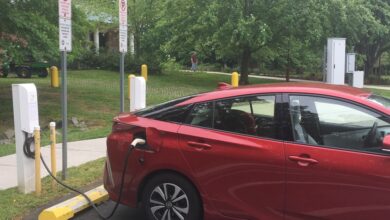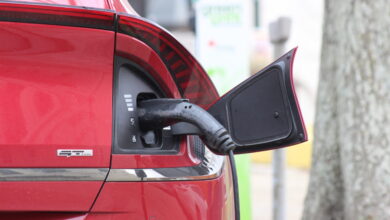Dimming electric vehicle market may delay start of full production at Ford’s new West Tenn. plant

Slowing demand for Ford’s F-150 Lightning electric pickup truck could delay the start of full production at the company’s new West Tennessee factory by at least nine months, until early 2026, according to the state senator representing the community home to the new facility.
State Sen. Page Walley, a Savannah Republican, told the Lookout his understanding is that full production of the truck at the BlueOval City campus in Stanton is delayed from its initially scheduled full production start date.
Based on “what’s happening, with (Ford’s) read on the economy,” the company might need “a little bit longer runway” before full production takes off, Walley said.
When Ford made the BlueOval City announcement in 2021, the Michigan automaker said it would start production in 2025. While hiring and work will begin next year, the first electric pickup trucks aren’t expected to be delivered to dealers until 2026, which the auto giant said is “on track.”
Clay Bright, chairman of the state’s megasite authority, said this week that Ford’s time frame “slid some,” but he didn’t think work was ever scheduled to start until the latter part of 2025, anyway. He added that the automaker is committed to finishing the plant, but “we really won’t know if they’re serious until they start hiring their staff that has to operate the facilities.”
Ford this week would not confirm or deny a delay in production at the plant on the state’s Memphis megasite.
But early this year, Ford announced the demand for electric vehicles had softened, forcing it to change some of its plans. It is delaying the start of electric vehicle production at its Oakville, Ontario plant from 2025 to 2027. The company still went through with retooling at the Ontario facility to produce electric vehicles. In Kentucky, the company put on hold a second battery plant. Ford CFO John Lawler said the decision was part of a $12 billion capital spending freeze as the company’s electric vehicle unit was expected to lose $1.3 billion in 2023.
Lawmakers are heavily invested in Ford’s success
Bright said the auto market has struggled with “uncertainty,” especially with the technology and demand for electric vehicles.
“It’s new, and, as you would expect, it’s kind of shaking itself out a little bit,” Bright said.
Tennessee lawmakers overwhelmingly approved nearly $1 billion for the $5.6 billion project three years ago as Ford promised to create 5,800 jobs
Walley said, however, he isn’t concerned about the state losing money amid Ford’s slowdown because of a “clawback” provision that would enable Tennessee to reclaim funds if the automaker fails to follow through on its investment and hiring promise.
“That’s kind of our security in this,” Walley said.
The construction site at the Memphis megasite looks comparable to downtown Nashville with multiple cranes visible from I-40 and production buildings already “under roof,” according to Walley.
The state is set to hold a ceremonial ribbon cutting there Friday for a $60 million Tennessee College of Applied Technology that will train Ford workers and provide education for the region.
Along with Ford and SK Innovation, the Tennessee Economic and Community Development Department has announced three Magna projects and an Avancez Assembly project that will supply the automaker.
Magna said it would invest more than $790 million to build two supply facilities at BlueOval, in addition to a stamping and assembly facility in Lawrenceburg in southern Middle Tennessee. Magna’s BlueOval plants will supply Ford with battery enclosures, truck frames and seats. Combined, the three will create 1,300 jobs in the state.
Avancez, meanwhile, is spending $54 million to expand its assembly operations and open a facility at BlueOval, creating 501 jobs specializing in modular assembly, sequencing and supply chain operations.



